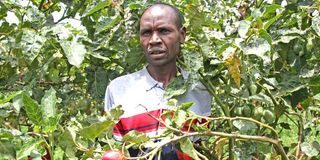Fruit farmer Reuben Talala has no plans to return to maize production

Mr Reuben Talala, 46, at his tree-tomato farm in Kapsinendet Farm in Mariashoni, Nakuru County.
What you need to know:
- Talala, 46, has been growing tree tomatoes since 2020.
- Uprooting tree tomatoes is not an option as he intends to put more land under the crop.
- Tree tomato yields fall after three years.
It is noon when Seeds of Gold reporters arrive in Kapsinendet, Mau forest, approximately nine kilometres from Elburgon in Nakuru County.
We find Reuben Talala and his wife Janet harvesting tree tomato fruits on their farm. Minutes later, retired teacher Vincent Kipyator arrives and helps himself to some fruits.
Talala, 46, has been growing tree tomatoes since 2020. He had only known maize production before that.
“I was introduced to tree tomato growing by my uncle Zakayo Mogotio. He had abandoned maize farming on his land in Keringet,” Talala says.
“Mogotio gave me a kilogramme of ripe fruits and showed me how to dry the seeds before planting them in a bed.”
After four months of watering and tending to the young tree tomatoes, he transplanted them on a quarter an acre of his land.
Talala sourced water from a well on his farm. Every hole was a foot deep and wide. The spacing between plants was two metres and three metres between rows.
That would give the plants space to grow properly. It would also allow him to spray, weed and harvest without much ado.
Talala used about Sh50,000 during this period, with most of the money going into buying organic manure, transport and labour.
Compared to other crops, tree tomato growing is less labour-intensive, Talala says.
He used herbicides on his plants to prevent late blight disease, especially during flowering. He added manure on the farm eight months later. This boosted the development of the fruits.
“The tree tomato section of the farm was invaded by aphids in the dry season. I was advised to use insecticides,” he says.

Mr Reuben Talala and his wife Janet display some of the tree-tomato fruits grown at their Kapsinendet Farm in Mariashoni, Nakuru County.
He harvested his first fruits a year after planting, though the yield was low.
“I continued to harvest after every two weeks and sold them locally. The yields and sales rose as days went by. I sold a fruit at Sh5, three pieces at Sh20 while a kilo retailed at Sh50,” he says.
Business was good as fruits were in demand. The country was reeling under a coronavirus-induced dusk-to-dawn curfew. Health authorities were advising Kenyans to consume fruits in the hope of beating the virus.
From last year, Talala has been selling a kilo of tree tomatoes for Sh75.
Talala and his wife have increased the portion of land under tree tomatoes to half an acre. Compared to other crops, fruits are in high demand. He now grows passion fruits and several others. Talala hopes to begin producing Hass avocado soon.
In the initial stages, Talala inter-cropped his tree tomatoes with leguminous crops like beans and peas to add nitrogen to the soil.
He says tree tomato farmers should form groups to negotiate prices.
“The county and national governments need to provide seedlings to farmers as happens with avocado producers. We should also be helped to access better markets,” says Talala.
He wants the government to send field officers to farmers and train them on the best practices.
“Many farmers get skills and new technology through publications, radio, TV and YouTube,” he says, adding that he visits fairs and seminars to get more knowledge on tree tomato production.

Mr Reuben Talala at his tree-tomato farm in Kapsinendet Farm in Mariashoni, Nakuru County.
One of the biggest problems Talala faced while growing maize was the high cost of inputs.
“I now have 500 tree tomato plants from the initial 200. One tree can produce 100 fruits or more,” Talala says, adding that land shortage is a challenge.
Tree tomato yields fall after three years. Many farmers uproot the plants.
Janet says her children are in school, courtesy of tree tomato production. Money from the venture also carters for other family needs.
Middlemen who used to visit the farm when the couple grew maize have vanished. Clients come direct to the farm. Uprooting tree tomatoes is not an option as he intends to put more land under the crop.
Talala hopes to produce on a large scale for the export market. If all goes well, he will buy a bigger piece of land and continue producing tree tomatoes.
“I want to be the leading tree tomato grower in Nakuru and the country,” he says.
Former Molo Sub-County Agricultural Officer, Alfred Waithaka, advises farmers to practise crop rotation and ensure soil on their land is tested before planting or re-planting.
He says that prevents harmful micro-organisms hiding in the soil from attacking the crops.
“Let farmers visit relevant authorities to get skills on better production techniques and pest and disease control,” he says.





